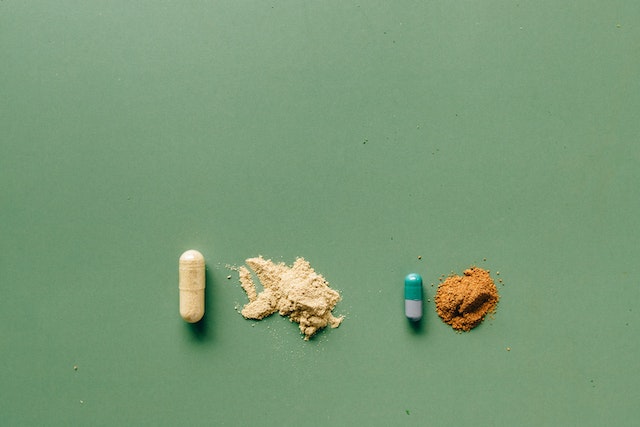Glutamine and creatine are two popular supplements athletes, and bodybuilders use to enhance performance and promote muscle growth.
While both supplements effectively restore the body, they work in different ways and have different mechanisms of action. This blog post will compare glutamine and creatine, highlighting the key differences between the two supplements.
Let’s find out which is more suitable for different goals and needs.
Glutamine vs Creatine: A Deep Dive
Athletes and bodybuilders have a general idea of what glutamine and creatine are. Let’s learn about these supplements a little more to understand how they affect the body of a highly physically active person.
The research found a close tie between the supplements and PCOS, Gynecomastia.
Glutamine is an amino acid found naturally in the skeletal muscles of the human body. It is involved in a number of important functions, including protein synthesis, immune system support, and gut health.
Under normal circumstances, Glutamine
- Promotes muscle growth
- Prevents muscle degradation
- Preserves muscle-building amino acid Leucine
On the other hand, Creatine is a substance found in muscles. It is produced from amino acids and synthesized in the liver, pancreas, and kidneys. It produces ATP, the primary energy source for muscle contractions. Your body uses ATP during extreme endurance activities.
Upon taking creatine supplements, you increase the stores of phosphocreatine. This is a form of energy that increases the production of ATP. Which then increases muscle mass, strength, and recovery.
Supplementation with creatine has increased muscle strength, size, and power and may also improve exercise performance and cognitive function.
So, which one is better? It depends on your goals and what you are looking to achieve.
Glutamine vs Creatine: Which Supplement Is Better?
If you want to reduce muscle soreness and fatigue, then glutamine may be the better choice. However, creatine may be more effective if you want to increase muscle strength and size.
Ultimately, your best choice will depend on your specific needs and goals. It is always a good idea to speak with a healthcare professional or sports nutritionist before starting any new supplement regimen to ensure that it is safe and appropriate for you.
Take a look at the key differences between Glutamine and Creatine to see which benefits you want for yourself.
Glutamine vs Creatine: Key Differences

Here are some key differences between glutamine and creatine:
Mechanism of action
- Glutamine is an amino acid involved in protein synthesis and supports immune system function and gut health.
- Creatine is a compound that produces ATP, the primary energy source for muscle contractions.
Benefits
- Glutamine supplements may help reduce muscle soreness and fatigue and improve recovery after extreme endurance workouts. (i.e. 2 hours of gym or running).
- Creatine supplements may increase muscle strength, size, and power and improve exercise performance and cognitive function.
Usage
- Glutamine is usually taken as a powder or capsule and is typically taken before or after workouts.
- Creatine is usually taken as a powder or capsule and is typically taken before or after workouts. It may also be taken by mixing in oats, water, smoothie, or juice.
Dosage
- The recommended dosage for glutamine is typically between 5-15 grams daily.
- The recommended dosage for creatine is typically in two regimens.
The first is called the creatine loading phase. Take 20-25 grams of creatine split into equal doses over the course of 5 to 7 days. After that, take 3-5 grams of creatine daily to maintain muscle growth.
The second option is to skip the loading phase and start with 3-5 grams of intake daily.
However, people who begin with the loading phase experience the supplement’s benefits 4 times faster.
Safety
- Glutamine is generally considered safe when taken at recommended dosages.
- Creatine is also generally considered safe when taken at recommended dosages, although some people may experience side effects such as bloating or gastrointestinal distress.
It’s important to note that these are general guidelines and that individual needs may vary. It is always a good idea to speak with a healthcare professional or sports nutritionist before starting any new supplement regimen to ensure that it is safe and appropriate for you.
Before you jump out of bed to get your car keys or credit card, read a little more as we address some myths surrounding Glutamine and Creatine.
Glutamine vs Creatine: Myth Busting
Before splurging money on supplements, it is crucial to be informed of the right information. As the supplements are shrouded mainly by bro science, a lot of claims the brands make are not necessarily true.
Take a look at these myths, for example,
Glutamine Myth
It is particularly effective at reducing muscle soreness and fatigue and may also help improve recovery after intense workouts.
Not true
According to research published in 2019, Glutamine supplement does not affect aerobic performance, athletic immune system, or body composition.
This means it won’t accelerate your lean muscle growth, undertaking, or recovery if you’re a normal gym goer or a bodybuilder.
True
The existing glutamine in your body will promote muscle growth, prevent muscle degradation, and preserve Leucine. The supplement will not be beneficial for common gym goers and bodybuilders.
Creatine Myth
Media reports claim that creatine damages kidney health upon regular consumption.
Not True
Creatine is formidable in its safety profile. According to a 12-week trial on various age groups of adults, creatine did not affect their kidney health.
However, if you already have kidney problems, please consult your healthcare professional before purchasing and consuming creatine.
Creatine causes bloating
Not true
The bloating only happens when you take the supplement during the creatine-loading phase. During this phase, the muscles tend to retain water, increasing your weight.
However, within a few weeks, athletes and bodybuilders eventually lose the water weight within a few weeks and gain a few pounds of lean muscle.
What if you stop taking creatine?

Who Should Take What: Glutamine vs Creatine
Both glutamine and creatine can benefit athletes and gym goers, but they may be more suitable for different groups depending on their goals and needs.
Glutamine is particularly suitable for athletes and gym goers who regularly engage in high-intensity workouts and sports. If you spend at least 2 hours in extreme endurance, work out as a professional bodybuilder and athlete.
Only then will glutamine help you to accelerate muscle recovery. For general gym goers, glutamine supplements may improve gut health to a certain extent.
Creatine, on the contrary, is more suitable for athletes and gym goers looking to increase muscle strength, size, and power and improve exercise performance.
It is also beneficial for those who are trying to improve cognitive function. As you increase the creatine storage in your body, some of it will go to your brain. And it may improve your brain health and prevent neurologic diseases.
Check if creatine effect acne or not.
Natural Sources of Glutamine and Creatine
Glutamine-rich foods
- Beef
- Seafood
- Nuts
- Milk
- Cabbage
- Eggs
If you don’t do high-intensity work out or professional sports, taking these foods regularly will be sufficient for your glutamine intake. Unless you engage in extreme physical activity, glutamine supplements will not reap any benefit.
Creatine-rich foods
- Herring
- Salmon
- Tuna
- Pork
- Beef
Besides these foods, an additional intake of creatine supplements will help you gain muscle weight and growth.
FAQ
Can glutamine replace creatine?
No. Glutamine can not replace creatine. Neither Creatine can replace protein. These two are pre-existing substances in the body that help in muscle recovery and muscle growth. Glutamine can only accelerate the recovery of an intense sportsman or an injured person.
Can You Take Glutamine and Creatine Together?
Yes, you can. Some studies have suggested that combining the two supplements is more effective than taking either alone. However, more research is needed to confirm these findings. Always consult a healthcare professional or sports nutritionist before starting any new supplement regimen.
Are there any side effects of taking glutamine or creatine?
Both glutamine and creatine are generally considered safe when taken at recommended dosages. However, some people may experience side effects such as bloating or gastrointestinal distress when taking creatine. People with certain medical conditions should take them cautiously and under medical supervision.
Conclusion
It’s important to remember that what we suggested was based on medical studies. The best way to determine if glutamine or creatine (or both) suits you is to speak with a healthcare professional who can assess your specific needs and goals.
The demands for supplements are highly dependent on the individual’s body. So only doctors can help you to determine the best course of action for you and ensure that any supplements you take are safe and appropriate for you.
Check our latest blogs to know more about supplements.

I started my professional career as a sports medicine consultant in Rola, Missouri. My primary role was to suggest suitable supplements for my patients according to their pre-existing conditions and lifestyle goals. I believe a healthy lifestyle is the most important if you want to make your life really meaningfull.

